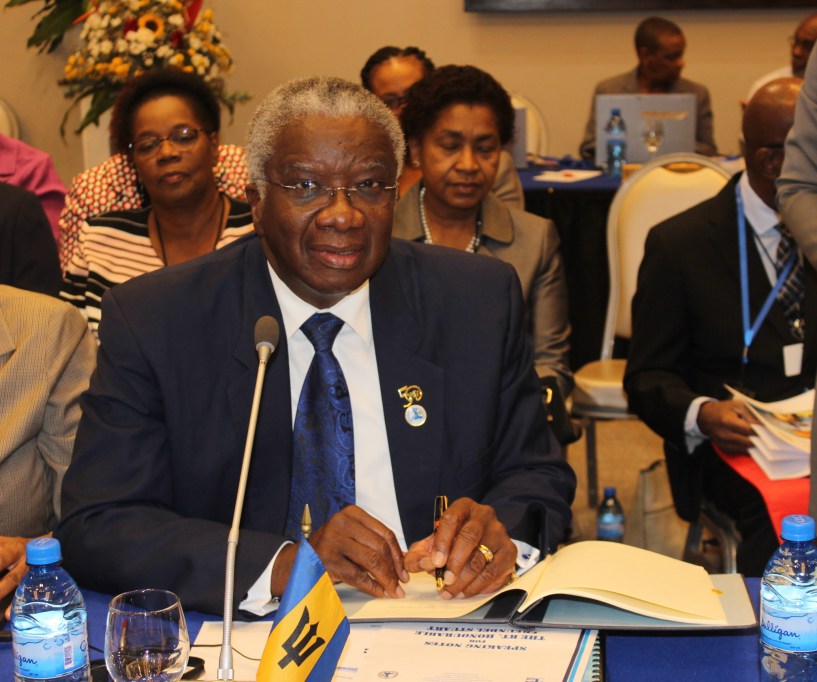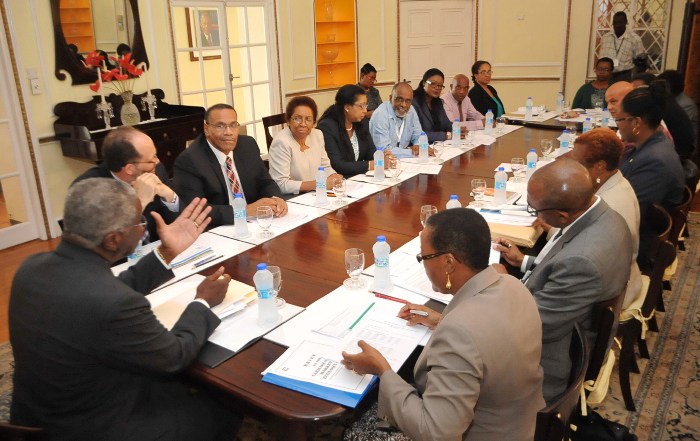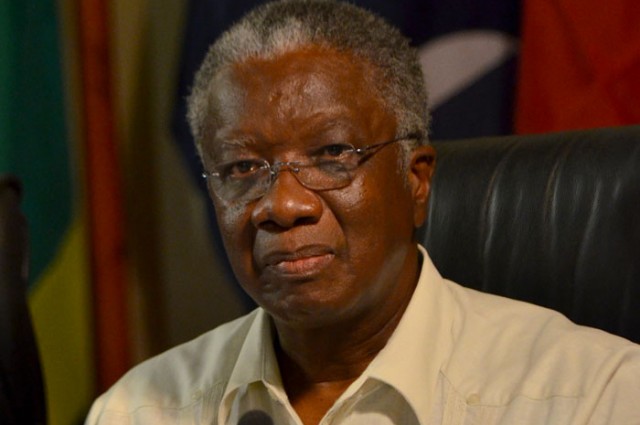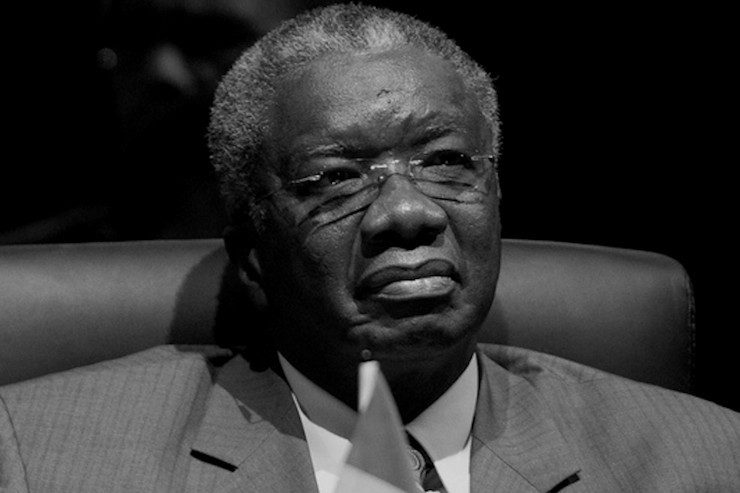Fifty years ago, in response to a letter from Errol Barrow received on the 27th day of June, 1965, the then Premier of British Guyana, Linden Forbes Sampson Burnham, came to Barbados on the 4th day of July, 1965 and discussed with Mr. Barrow the formation of a Caribbean Free Trade Association.
Barrow and Burnham subsequently interested the then head of Government of Antigua, Vere Cornwall Bird, in their project and at Dickenson Bay in Antigua, the agreement establishing Carifta was signed.
Later, in October 1967, at a conference held here in Barbados, all of the other English speaking countries of the Caribbean committed themselves to the Association and Carifta became a flourishing reality. It is especially appropriate, therefore, that exactly 50 years after that famous meeting in the Cabinet Room here in Barbados between Errol Barrow and Forbes Burnham, Barbados should be hosting the 36th Regular Meeting of the Heads of Government of the Caribbean Community.
I am pleased therefore to welcome all of my colleague Heads of Government, Heads of delegations and indeed all delegates to Barbados. It is my especial pleasure to welcome to their first regular meeting as Heads of Government, the distinguished President of the Cooperative Republic of Guyana, Brigadier David Granger, the distinguished Prime Minister of St. Kitts and Nevis, Dr. the Hon. Timothy Harris and the distinguished Premier of Montserrat , the Hon. Donaldson Romeo. The presence of these three distinguished gentlemen, along with the return to office of the distinguished Prime Minister of Dominica, the Hon. Roosevelt Skeritt and, more recently, the distinguished President of Suriname, Desi Bouterse, is proof positive that the democratic machinery in our CARICOM region is not only well oiled but also is performing optimally.
We look forward, of course, to the enrichment of our deliberations which will result from the interventions of our new Heads of Government from whom you have heard earlier this evening.
I reserve a very special welcome this evening for the distinguished Secretary General of the United Nations, His Excellency Mr. Ban Ki-Moon who honours Barbados and this conference with his visit as one of our special guests. His speech here this evening is evidence, at once eloquent and moving, of his known commitment to and passion for the cause of developing states in general and of small island developing states in particular. I hope that the Secretary General will enjoy to the full, his all too brief but action packed stay here in Barbados.
‘We cannot relax our goal of perfecting Regional integration’ – Incoming CARICOM Chairman
It is my especial pleasure, also, to welcome to this opening ceremony the distinguished Secretary General of the Commonwealth, His Excellency Mr. Kamalesh Sharma. His term of office comes to an end this coming November. For the full duration of his incumbency, he both embodied and promoted the values of the Commonwealth and now leaves it an institution of which we can all, with justification, continue to feel proud.
Tomorrow, we will also welcome to Barbados and to the conference as a special guest, the distinguished President of Panama, His Excellency Senor Juan Carlos Varela Rodriguez. He will be with us here from July 3rd to 4th . The Republic of Panama continues to be interested in deepening its relationship with our Caribbean Community and it is both happy and fortuitous that President Varela should be attending this 36th Regular Conference here in Barbados, for about 60, 000 of this country’s citizens left these shores to contribute directly and indirectly to the construction of the Panama Canal.
“Panama money” contributed much to the stability and burgeoning development of some of our Caribbean states in the first half of the last century. As Caricom countries and those of the Central and South America become more deeply integrated, the relationship with Panama will become increasingly important. I look forward to his interaction with us.
I hope, of course, that all of our visitors will make some time to savour the miscellany of culinary and cultural delights always on offer here in Barbados. The entire nation welcomes you all.
Mr. Chairman,
I indicated earlier that we meet on the occasion of the 50th Anniversary of the decision of two countries to establish Carifta. At the time of taking that decision, there was no Caribbean Development Bank, no Caribbean Tourism Organisation, no Caribbean Meteorological Institute, no Caribbean Agricultural Research and Development Institute, no Caribbean Examinations Council, no Caribbean Festival of Creative Arts which we celebrate once again this time in our sister member state, Haiti, in August this year, no Caribbean Court of Justice, no Caribbean Public Health Agency, no Council of Legal Education and certainly there was no Caribbean Community and Common Market.
There were no Carifta Games to provide some of the finest sprinters the world has yet seen. All of these institutions and many others have been the result of the renewed efforts of Barrow, Burnham and Bird, in the first instance. Of course, the other countries, seeing the wisdom of these efforts, joined in the thrust to bring the people of the Caribbean closer together after the failure of the Federal Experiment in 1962.
Just about five years after the establishment of Carifta, the hindsight, the insight and the foresight of four leaders in our region, Dr. Eric Eustace Williams, Linden Forbes Sampson Burnham, Michael Norman Manley and Errol Walton Barrow resulted in their meeting at Chaguaramas
in October 1972 and deciding that Cuba’s isolation in this region should come to an end. In so doing, it now emerges, they anticipated the United States of America by forty –three (43) years.
One year later these same four leaders met again at Chaguaramas and signed the treaty establishing the Caribbean Community, thereby moving the region from the limited and limiting concept of a Free Trade Area to the broader and deeper concept of regional integration.
In 1989, Caricom leaders meeting at Grand Anse in Grenada took the further step of agreeing to the creation of a single market and a single economy (CSME) as a means of deepening the regional integration movement contemplated by our founding fathers. CSME was not intended to uproot and replace the goal of regional integration but was yet another means by which that goal could be facilitated and achieved.
Regional integration is still the aim of our endeavours. A single market and economy is for sure another effective means to the realisation of that aim.
With every passing day, week, month and year, we try by the things we say and by the things we do to make our integration movement more perfect. There will always be things that we have not yet done, and there will always be things that we have already done but that we can do better. There will never come a time, however, when we will all be able to fold our arms and proclaim: “now the labourers’ task is o’er. We have a perfect integration movement.”
Yet we cannot and should not relax pursuing the goal of trying to make our integration movement a perfect one. “A man’s reach should always exceed his grasp, Or what’s a heaven for?” as the poet Robert Browning so discerningly observed.
It helps the regional cause none, therefore, when across the region a few merchants of the ritualistic and a few purveyors of despondency and despair, seem to derive less pleasure from celebrating our accomplishments than they do from highlighting what we have not yet been able to achieve.
The pursuit of that unwelcome and unhelpful course can only have the effect of imbuing our people with a sense of their own inadequacy and of weakening their enthusiasm to aspire, to aim and to achieve at a time when they have so much to offer, and indeed when so much remains to be done.
Remarkably, Heads of Government of the Caribbean Community did not meet in 1975, 1976, 1977, 1978, 1979, 1980, or 1981 but the regional integration movement survived. Today, when Heads of Government are meeting twice annually, once in regular conference during the first week of July, and once in Inter-sessional, usually during the month of February, and making concrete decisions, cynics still unabashedly, publish obituary notices in respect of the regional integration project.
As leaders for the time being of our respective countries we must accept the solemn responsibility which devolves on our shoulders to raise the gaze of our people to new and hitherto unimagined regional horizons.
No where is this more necessary than in the area of food security. For how much longer are we going to repeat that between the lands of Guyana, of Belize and now also of Suriname, we have the veritable breadbasket of the Caribbean?
Has the time not come, is the hour not upon us when we must, in a structured manner mobilize the idle hands in our region around the idle lands in our region and deal systematically with the food security issues we have been facing. If our palates are being held on mortgage by producers of food outside of this region, are we still justified in thinking ourselves genuinely independent?
We meet at a time when the region continues to feel the effects of the worst crisis the Western world has faced since the Second World War, and perhaps the most sustained crisis in about 100 years. At the best of times our countries have been fiscally fragile and this crisis has rather cruelly exposed how vulnerable we are to exogenous shocks.
Our tourism and financial services sectors have been hard hit with consequences for our revenues, our debt to GDP ratios, and the dangerous debt overhang that results from severe fiscal imbalances. All of this has had implications for employment levels, particularly among the youth in our respective countries.
Of particular concern to us in recent times, however, has been the behaviour of some of our foreign owned commercial banks which have worn seemingly permanent smiles on their faces when repatriating dizzying profits from our countries during times of economic and financial plenty, but which now seem unwilling to hold hands and walk with us during this period of economic and financial challenge.
The conduct which we have been witnessing is troublingly reminiscent of a past era when countries in this region were seen just as a collection of outposts, useful only for the extraction of mineral and agricultural wealth by richer and more powerful countries, and useful too for the consumption of the finished products manufactured in those countries.
In those days there was no need for a special vocabulary to describe the movement of wealth from this region to the North Atlantic. In our time, however, we have witnessed the invention of a whole new vocabulary to describe any seeming movement of wealth from the North Atlantic to our countries.
If this is what globalization means, the late Professor Rex Nettleford may well have been right when he said that it is just a new name for old obscenity.
Is it any wonder then that the issue of reparations and reparatory justice continues to be a hot agenda item for us here in this region?
Yet as a region, we cannot afford to be daunted by any of these happenings. We must keep our perspective, think and work through our economic and financial challenges, and continue to run with patience the race that is set before us. To this challenge, I think that, as a region, we are more than equal.
The talent pool in the Caricom region is as rich as that which can be found in any other region in the world. We have demonstrated this time and time again, in the area of culture, sport, literature, the arts, in the world of academe, and in the way we have managed the development of our societies and economies in the face of formidable challenges.
The vibrant societies in this region have put us in the favourable position of being able to undertake, with confidence, the task of creating resilient economies for the benefit of all of our people.
The Caribbean is a civilisation which has always had much to share with the rest of the world. As we all know by now, small size has never determined the capacity of a people to nudge history in any particular direction.
During the course of my chairmanship over the next six months, a number of meetings, important to the future of our region , are scheduled to take place. There will be the Third International Conference on Financing for Development to be held in Addis Ababa in July; the special UN conference on the post – 2015 agenda to be held in New York at the time of the 70th Anniversary of the United Nations in September ; the Commonwealth Heads of Government Conference in Malta in November where among other things a new Secretary General is to be chosen; and critically the final Conference of the Parties to the United Nations Framework Convention on Climate Change in Paris in December, at which it is hoped that a universally binding agreement can be reached.
In all of these fora, Caricom’s mature, balanced and constructive voice will have to be raised and heard in the promotion and defence of the worthy cause of Small Island Developing States.
Barbados celebrates the 50 years of sacrifice and hard work towards the integration of our region and honours all of our forebears who have invested so much of their time and energy in helping to build what we have today. We cannot afford to let them down.
It is in that understanding that we meet in the 36th Regular Conference of the Heads of Government of the Caribbean Community to tackle the wide range of issues that appear on our agenda. Issues whose rationale is not only the pursuit and achievement of sustainable development for our respective countries, but also the accelerated integration of the people and the economies of our Caribbean Region.
In the face of all of the robust debate, energetic discussion and, in some cases, unavoidable disagreement that will necessarily characterize our deliberations, we remember with respect, the immortal words of the late Dr. Eric Eustace Williams on the occasion of the signing of the Treaty of Chaguaramas on the 4th July, 1973, words to be studied not for avoidance, but for enlightenment and emulation: ”All our strength is in our union, all our danger is in discord.“ By this timely reminder let us all be guided, as we commence our deliberations at this 36th Regular Conference of Heads of Government of the Caribbean Community.
Thank you.






